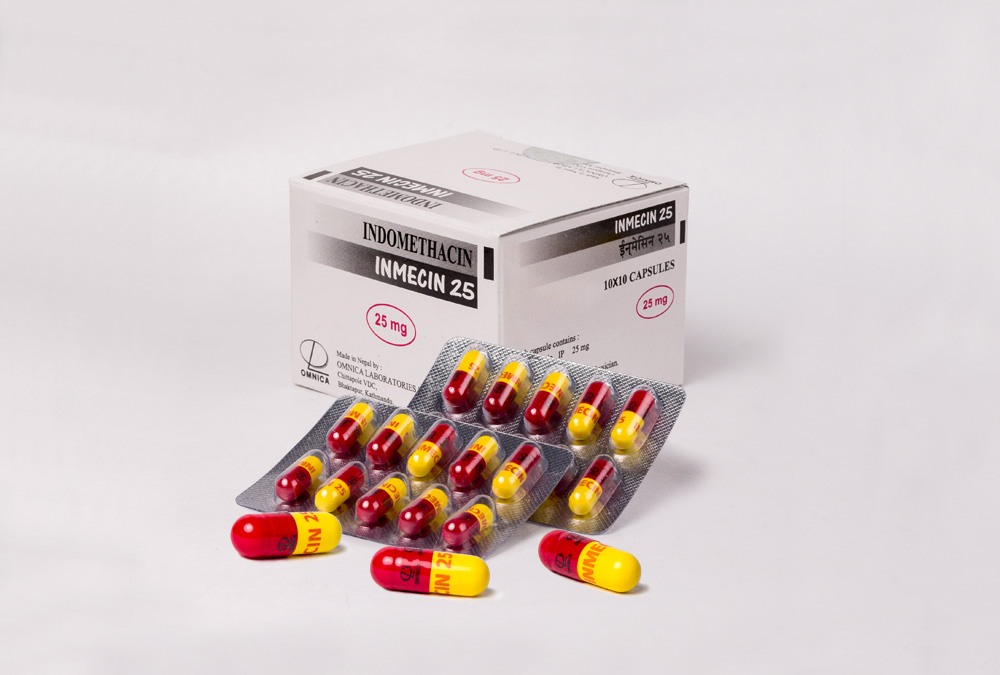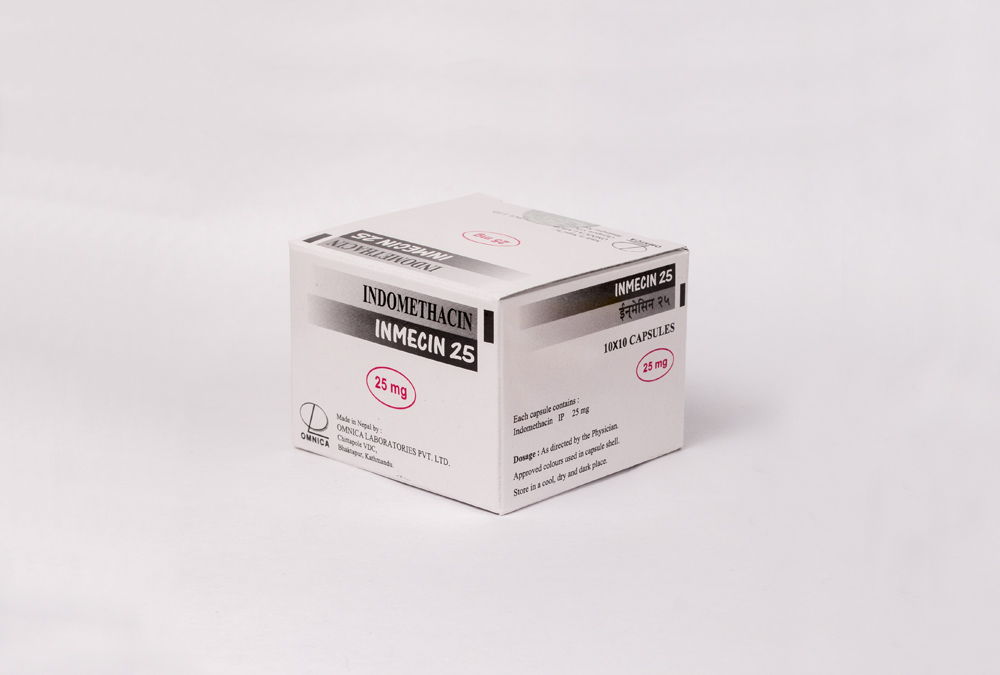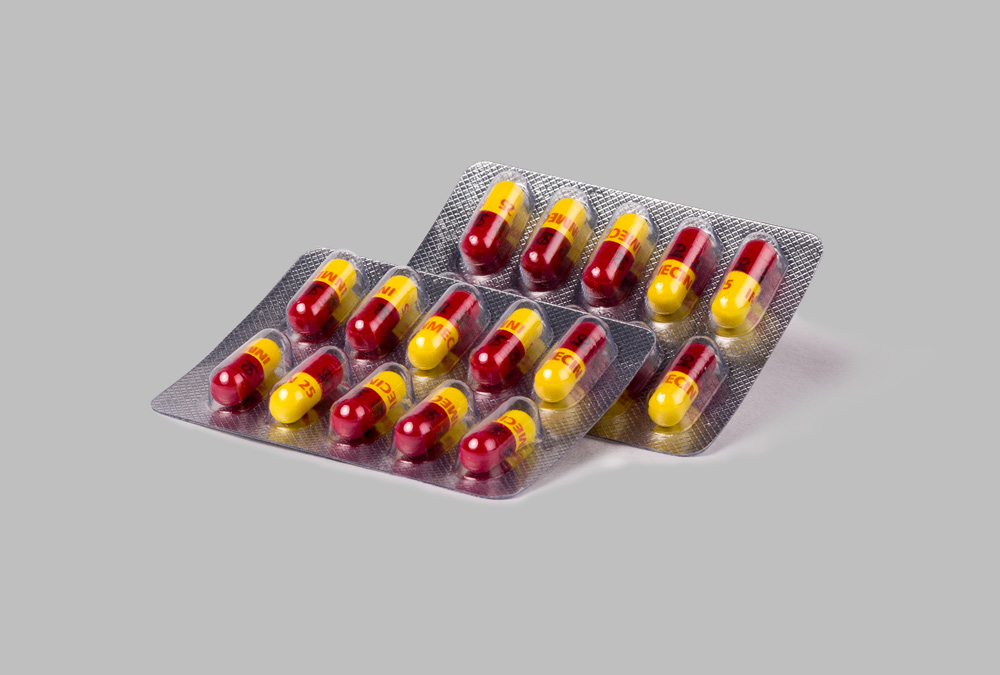Brand Name : INMECIN
Generic Name : Indomethacin
Preparations : 25 mg / 50 mg Capsules
Pharmacological Category : NSAIDs
Mechanism of Action (MOA)
INMECIN (Indomethacin) is a more potent nonselective inhibitor of the cyclooxygenases (COXs) than Aspirin. INMECIN also inhibits the motility of polymorphonuclear leukocytes, depresses the biosynthesis of mucopolysaccharides and may have a direct COX-independent vasoconstrictor effect. INMECIN has prominent anti-inflammatory and analgesic-antipyretic properties similar to those of the salicylates.
Pharmacokinetics
- Absorption : Readily absorbed from the gastrointestinal tract
- Peak Plasma Concentration : 2 hours
- Onset of Action : 30 minutes
- Distribution : Distributed into synovial fluid, the CNS, placenta and breast milk
- Protein Binding : About 99%
- Metabolism : Liver; significant enterohepatic recirculation
- Bioavailability : Almost 100%
- Elimination Half-life : 4.5 hours; prolonged in neonates
- Excretion : Urine (60%); faeces (33%)
Indications and Dosage
- Inflammatory / Rheumatoid Disorders (lowest effective dose): INMECIN 25 to 50 mg two or three times a day; maximum dose: INMECIN 200 mg per day; in patients with arthritis and persistent night pain and / or morning stiffness, maybe given high dose up to INMECIN 100 mg of the total daily dose at bedtime.
- Bursitis / Tendonitis : Initial dose: INMECIN 75 to 150 mg per day in 3 to 4 divided doses
- Acute Gouty Arthritis : INMECIN 150 to 200 mg daily; usual treatment is for up to 3 to 5 days
- Nephrogenic Diabetes Insipidus : INMECIN 2 mg per kg per day divided every 8 hours
- Dysmenorrhoea : up to INMECIN 75 mg daily
- Acute Pericarditis : INMECIN 25 to 50 mg four time a day
Side Effects
COMMON : Gastrointestinal disturbances, headache, vertigo, dizziness and lightheadedness
MAY OCCUR : Gastrointestinal perforation, ulceration and bleeding
RARE : Intestinal stricture
REPORTED : Leucopenia, purpura, thrombocytopenia, aplastic anemia, haemolytic anaemia, agranulocytosis, epistaxis, hyperglycaemia, hypoaldosteronism, hyperkalaemia, vaginal bleeding, hepatitis, jaundice and renal failure
OTHERS : Tinnitus, confusions, depression, insomnia, psychiatric disturbances, syncope, convulsions, coma, peripheral neuropathy, blurred vision, corneal deposits, ocular effects, edema, weight gain, hypertension, haematuria, skin rashes, pruritus, urticaria, stomatitis, alopecia, hypersensitivity reactions
Contraindications
Hypersensitivity to indomethacin, aspirin, other NSAIDs, pregnancy (3rd trimester), treatment of perioperative pain in CABG surgery, necrotizing enterocolitis, impaired renal function, active bleeding (including intracranial hemorrhage and gastrointestinal bleeding), coagulation defects, untreated infection, thrombocytopenia, congenital heart disease
Warnings / Precautions
- Indomethacin should be taken with or after food or milk to reduce the risk of gastrointestinal effects.
- Caution in patient with hypertension, CHF (congestive heart failure), fluid retention, epilepsy, parkinsonism, psychiatric disorders, history of bronchospasm and during lactation.
- Monitor ophthalmologic, blood, electrolytes and renal function regularly.
Drug Interactions
- Concurrent use may increase plasma concentration of digoxin, lithium, methotrexate and leads to toxicity.
- Increased risk of hyperkalemia when used with ACE (angiotensin converting enzyme) inhibitors or potassium sparing diuretics
- Increased risk of nephrotoxicity with ACE inhibitors
- Excessive blood thinning occurs which may lead to bleeding when taken with anticoagulants (warfarin).
Pregnancy Category : C
Presentations
INMECIN 25 mg : A box of 10 blisters, each blister of 10 tablets
INMECIN 50 mg : A box of 10 blisters, each blister of 10 tablets



